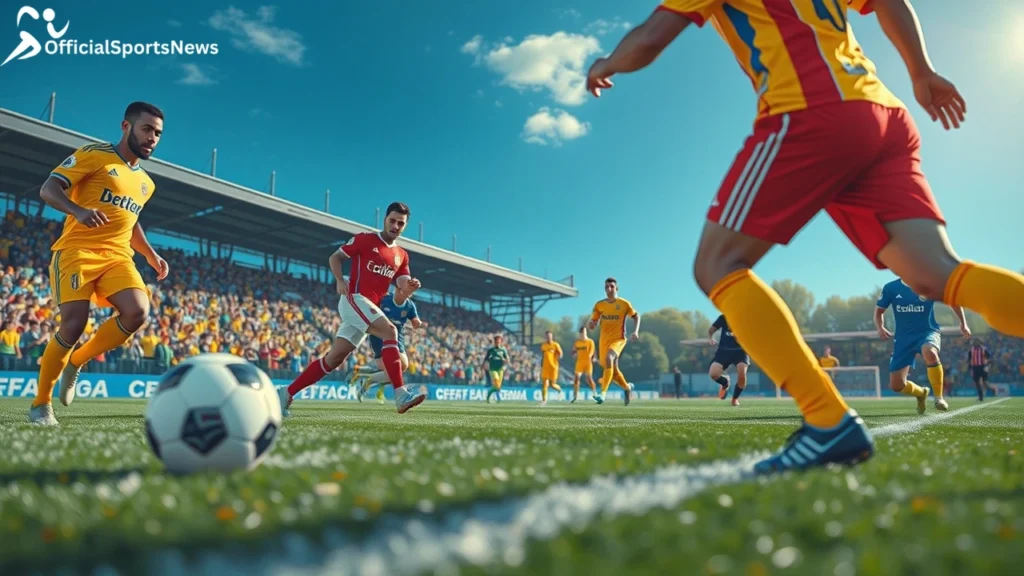Introduction: How Long Is a Soccer Game?
If you’ve ever been to a soccer game, perhaps you’ve found yourself thinking, How Long Is a Soccer Game? Knowing the length of soccer games is vital for all those keen on the game, whether you’re a casual fan of the sport, a player, or even someone new to soccer. The typical soccer game is far more than a standard 90 minutes of play. There are stops, additional time, and penalty kicks, which can impact the game’s duration. This guide is designed to answer your questions regarding the length of the soccer match, the factors that affect the length of the match, and what factors affect rules that affect the general duration of the game.
The Standard Length of a Soccer Game
The length of an official professional soccer match is 90 minutes and divided into two 45-minute halftimes. It is the fundamental structure for all soccer matches worldwide, from leagues for local players to World Cup finals. The initial 45 minutes are followed by a 15-minute period of halftime, during which the players can rest and think until the beginning of the second half. The game, however, isn’t the same every 90 minutes. Let’s look at the reasons.

What Happens During the First and Second Halves?
Every half of a soccer match is played for 45 minutes. The clock continues to run continuously during the entire game. The official is accountable for making sure that both halftimes are played to their full length of time. But, the truth is time; the clock may not provide the complete story.
In the initial and second periods, it is possible to experience delays due to a myriad of causes, including accidents, fouls, or even time wasted for substitutions. To account for delays, the referee will add extra time called stoppage time (also known as injury time). It ensures that the total play time is close to 90 minutes.
The second part of the game proceeds as the first half; however, if the score is close or the match is vital to the tournament, extra time could be granted by way of additional time or an extra shootout.
Stoppage Time: How Does It Affect the Duration?
Although the game is designed to last for 90 minutes, it isn’t possible to stop the clock to allow breaks during play. Stoppage time will compensate for any lost time during the second half. How Long Is a Soccer Game with the stoppage period? The referee determines stoppage times, which may be between one minute and five minutes or more, depending on the time throughout the game.
Why is Stoppage Time Added?
Time for stoppage is compensated for the above:
- Injuries: When a player has an injury, and medical attention is required, the ref ends the game.
- Substitutions: Referees will also add time to compensate for lost time as players are off the field until new players are added.
- The use of time: Sometimes, an individual team might deliberately delay the game, especially toward the end of a game. The official will then add more time to ensure both teams have an equal chance of playing.
Important to keep in mind that the time for stopping is only an approximate figure, as the judge will have the final say on the amount of time to be added.
Extra Time: When Does It Apply?
A 90-minute game in certain soccer tournaments isn’t enough to determine who will win. If the game ends in a tie after regulation and there is a need for a winner (such as in knockout tournaments), it is decided to go into an additional duration period.
What is Extra Time?
Extra time refers to a duration that is added to regular time for teams to have more opportunities to score. It comprises two 15-minute portions, increasing the potential duration of the match by up to 120 minutes. If the score remains tied at the end of extra time, it could be decided to go towards a penalty shootout to determine who wins.
Extra time is played out in full without having a time-out between the two halftimes. It could be perceived as crucial during the game because the players usually feel exhausted after 90 minutes. Extra time could be a factor in the outcome.
Penalty Shootout: The Final Decider
If the match is in a tie after the extra period when a winner has to be determined, the game goes into the penalty shootout. It is an exciting option to decide the outcome and stressful for supporters and players alike.
How Does a Penalty Shootout Work?
The penalty shootout consists of the teams, each having to take five penalties. The team that scores the most scores after the five rounds wins the game. If the score remains in a tie after the first penalty round and the shootout is an end-of-the-game, each team takes one penalty at a given time until one team wins while neither team scores.
A penalty shootout can be fast, lasting anywhere from 10-15 minutes, but it’s also the last decision in games where additional time didn’t result in the desired result. Although penalty shootouts aren’t frequent in games, they’re commonly used for competitions like the FIFA World Cup, UEFA Champions League, and National Cup matches.
How Long Is a Soccer Game in Different Competitions?
The duration of a soccer match will vary based on the type of competition. Most regular league matches adhere to the 90-minute rule of action. However, tournaments, knockout rounds, or other events with a prize for the winner could prolong the duration of a game by adding penalties and time.
Regular League Matches
For most international and domestic tournaments, a soccer match is 90 minutes long and split into two 45-minute periods in which stoppages are added in the middle of each period. It is the usual length of games for leagues such as the English Premier League, La Liga, and Serie A.
Tournaments and Knockout Rounds
For events such as the FIFA World Cup, UEFA Champions League, or Copa America, a match could be delayed by 120 minutes, with additional time, if the score remains tied after regulation. If no one emerges as the winner in the extra time, an extra shootout may be played to end the deadlock.
How Long Is a Soccer Game in Youth and Amateur Leagues?
For youth soccer, the time of a match depends on age and the rules of the particular league. Most youth soccer matches tend to be shorter to cater to young players’ focus spans and physical endurance.
Common Game Durations for Youth Soccer
- U-6 (Under 6): 2 x 20-minute halves
- U-8 (Under 8): 2 x 25-minute halves
- U-10 (Under 10): 2 x 30-minute halves
- U-12 (Under 12): 2 x 35-minute halves
- U-14 (Under 14): 2 x 40-minute halves
- Ages 16 and older Two 45-minute half-hours (similar to adult match)
The shorter durations of games are created to be easier for young players. It will ensure that they remain active and stimulated and not get tired. As the players get older and older, the game time will increase to meet the standard for professional players of 90 minutes.
Other Factors That Affect the Duration of a Soccer Game
There are a variety of other variables that affect the length of soccer matches:
- Delays and injuries: The reasons for delays and injuries are mentioned before. Injuries or other disturbances (such as the weather or crowd disruptions) may prolong the time of a game.
- Substitutions: Every team can make at most three substitutions in the regular game, but additional substitutions are allowed during the extra period. Substitutions can prolong the game if players are removed from the playing field.
- Weather Situations: Extreme weather, such as heavy rain or lightning, may cause delays or even stoppages during the game, resulting in a more prolonged overall duration of the match.
- Referees’ Decisions: The referee can increase the duration of the match when they feel excessive time lost during the game because of injuries, time-wasting techniques, or any other irregularities.
Conclusion: How Long Is a Soccer Game?
The typical soccer match is 90 minutes and divided into two 45-minute periods, which are stopped after the portion. Some tournaments may require extra time, or penalty shootouts could increase the time to 120 minutes. The game’s length will vary based on the circumstances, such as substitutions, injuries, and if the event is one of the knockout events. Now that you understand the length of a soccer match and how long it lasts, you’ll have a greater knowledge of the game’s structure and timing. If you’re at the local soccer game or big tournament, you’ll understand how the duration of a match can be determined and how the anticipation can go beyond the 90-minute norm.
FAQs
Q1. How Long Is a Soccer Game that has extra time?
Soccer games with added time run for around 120 minutes (90 minutes of normal play and two 15-minute half-hours of added time). It will be held if the score is at a point to the point of a penalty shootout.
Q2. What is the most effective duration of a soccer match?
The referee decides the duration of the stoppage. However, it usually ranges between one and five minutes for each half, based on the length of the delay.
Q3. What is the duration of a soccer game played by children?
Based on the level of play and league rules, soccer games for children typically last around 40 to 70 minutes.
Q4. How long is the duration of a penalty shootout in soccer?
The typical penalty shootout takes between 10 and 15 minutes, contingent on the number of rounds required to decide who is the winner.



